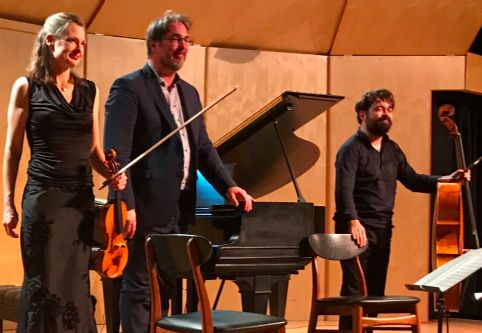|
Symphony
MYSTICAL PLANETS AND LIVELY GERSHWIN ORTIZ AT FINAL SRS CONCERT
by Peter Lert
Sunday, May 4, 2025
Symphony
VSO'S CONCERT MUSIC OF TIME, MUSIC OF PLACE
by Peter Lert
Sunday, April 27, 2025
Choral and Vocal
VOCAL ELEGANCE AND FIRE AT THE 222'S RECITAL APRIL 26
by Pamela Hicks Gailey
Saturday, April 26, 2025
CANTIAMO SONOMA SINGS AN INSPIRED GOOD FRIDAY MOZART REQUIEM CONCERT
by Pamela Hicks Gailey
Friday, April 18, 2025
DRAMATIC SHOSTAKOVICH SYMPHONY CLOSES PHILHARMONIC'S 25TH SEASON
by Terry McNeill
Sunday, April 13, 2025
LARGE COLLEGE OF MARIN AUDIENCE GREETS STOPHER ARTISTRY
by Terry McNeill
Saturday, April 5, 2025
Chamber
FRISSON DELIVERS SHIVERS OF DELIGHT
by Abby Wasserman
Sunday, March 30, 2025
OLD AND MOSTLY NEW IN SRS MARCH CONCERT IN WEILL
by Peter Lert
Saturday, March 22, 2025
Symphony
TWO FORMIDABLE SYMPHONIES AND PURPLE MOUNTAINS AT SRS CONCERT
by Peter Lert
Sunday, February 23, 2025
Chamber
THE PARKER CAPTURES DEMANDING ADES QUARTET AT RAC SEBASTOPOL CONCERT
by Peter Lert
Saturday, February 15, 2025
|
 |
 ATOS Piano Trio Nov. 3 At the Occidental Performing Arts Center (J. McNeill photo) |
ATOS TRIO IN OCCIDENTAL CHAMBER CONCERT
by Terry McNeill
Saturday, November 3, 2018
When the Berlin-based ATOS Piano Trio entered the cramped Occidental Performing Arts stage Nov. 3, the audience of 100 anticipated familiar works in the announced all-Russian program. What they got was a selection of rarely-plays trios, with a gamut of emotions.
Then one-movement Rachmaninoff G Minor Trio, Op. Post, opened the music and the Trio caught the surging Romantic themes, first warmly set out by cellist Stefan Heinemeyer. Attacks were clean throughout, though the sub-professional stage piano contributed to fast but blurred scale playing from pianist Thomas Hoppe.
Mr. Hoppe’s strong playing continued into a performance of Arensky’s D Minor Trio, Op. 32, and a work that has been a personal favorite since a Pennario-Heifetz-Piatigorsky concert long ago in Los Angeles. Subsequently the Borodin Trio’s recording set the standard, and our local Trio Navarro has specialized in the Arensky 1st. The opening theme had great nobility, with a gentle throbbing richness from violinist Annette von Hehn. Ms. Von Hehn took the repeat of the opening theme at reduced volume and with a delicate ritard, exactly the thing to do in this music, but during the evening she often didn’t take notes squarely and occasional pitch variation popped up. High register string sound was admirable in both the cello and violin.
The scherzo was played at a brisk tempo but in Mr. Hoppe’s speedy scales individual notes were lost. The interjecting “palm court” theme had a charming waltz character, and admirable spiccato bow from cello and violin.
Mr. Heinemeyer broadened his already broad vibrato in the elegia’s opening theme, swelling beautifully on individual notes and showed deft control of pianissimo. In the finale the string unison pizzicato was perfection, and the entire movement’s playing was muscular and convincing.
Beginning the second half were three folks dances, Op. 13b, by the Russian Alexander Weprik. They passed quickly but not without notice, especially the first and third with bottom register cello support and often raucous and blaring peasant rhythms. The lyrical second waltz had a banal theme that wound in and out of all three instruments, but was alluring and ended in a whisper. An effective work.
Shostakovich’s Trio No. 2 in E Minor, Op. 67, begins in an eerie upper register string murmur, and is difficult to accurately mesh the instruments, with the violin and cello lines far apart and strange harmonies all about. The main theme was played with a ringing sound, and the ending of the andante – moderato had a sarcastic character in even string tempo. An authoritative reading.
Playing in the scherzo was slashing and intense, with contrasting staccato phrases that morphed to light gaiety and thumping chords and swirls of sound. Mr. Hoppe’s opening chords in the largo were played with the shift pedal and the sad lament was in a way just as intense as the music of the scherzo. There were many powerful but simple chords, six seconds apart, that were unique and masterfully played.
A cascade of anguished sonority was heard in the finale allegretto, a menacing movement leavened by short folk-music phrases and quiet double-stops from Ms. von Hehn. Some parts of the interpretation seemed comedic and even mechanical, but with dark contours. There was little letup in the anxious momentum, and Mr. Hoppe’s strong right-hand tremolos led to a subdued conclusion.
There was no encore offered, and applause was muted, presumably due not to the level of performance but to such disturbing music.
|

